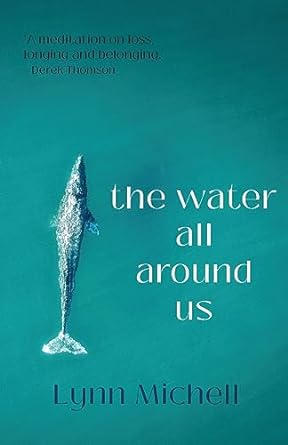The Water All Around Us
Lynn Michell
(Linen Press, 2023; pbk, £11.20)
The water all around us is Lynn Michell’s fifth novel. Set on a remote Hebridean island, it deals with personal loss, loneliness and the environmental crisis facing our seas. The author is Director of Linen Press, a small, independent women’s publisher, recently moved from the south of France to North Uist. No doubt Michell’s new home was the inspiration for the novel’s setting.
Fenn’s parents have recently moved to a tiny island in the Western Isles. The nine-year-old is shunned by her new classmates and turns to the beach outside her home for solace. Jess is a marathon swimmer who has come to live on the island after a personal tragedy.
Out in the sea, a young whale has become separated from its family on its migration north and is trying frantically to relocate them. Disorientated by boat engine noise, drifting fishing nets that entangle other sea creatures and plastic waste, the whale enters dangerously shallow waters surrounding the island. As Jess befriends the lonely girl and teaches her to swim, the fates of the three swimmers become dangerously interlinked.
Lynn Michell has again turned to the littoral as a stage for her latest novel. Her previous, The Red Beach Hut (2017), was set in an English seaside resort town, with most of the action taking place on the beach. She clearly loves using such liminal spaces as blank canvases for her narratives to unfold.
The wildness of the novel’s location serves to emphasise her protagonists’ isolation and loss; Fenn’s retreat inside of herself is an act of self-protection and her love of the sea is an escape from her classmates’ unfriendliness. Jess, on the other hand, is swimming away from inner demons after the tragic loss of her partner in a drowning accident. As Fenn’s swimming skills become stronger, she is tempted to go further out from the shore and hears the whale’s distressed song. Back at home, she becomes obsessed by learning about whale song and its importance in the pod’s communication system. Her parents dismiss the possibility of the whale’s proximity, but she is not daunted. She tries to sing back to the whale whilst swimming underwater, unaware that she could be luring him in to the shore, an unwitting siren.
One of the novelist’s strengths is her ability to enter the mind of a child and this element of the story is similar to the previous novel which also explores bonds developing between her adult and child protagonists, from initial suspicion and hostility; for Fenn, the gradual trust-building and mentoring relationship with an adult friend has the power to heal two wounded souls. The whale’s narrative is perhaps the most challenging aspect of the novel, certainly for the author. His story must be convincing and yet must escape anthropomorphism. To achieve this, tells the story of the whale’s separation from his pod and his attempts to relocate them through his senses:
When he swam his first migratory journey… he laid down in his memory the early tracks of a musical score… a reliable and trusted sound map. The humming and shrill beeps came to him like notes along a wire that stretched from one side of the ocean to the other, a trail which the older whales followed with absolute sureness, and he followed the older whales…. [he] hears the ocean’s unreadable cacophony made by scurrying fish and slapping weeds and other loud noises which seem to come from on top of the water and which he does not recognise.... On he goes, calling again and again, but as he twists and turns, starts and falters, nothing reaches him except the turbulence of currents and the slaps and splashes of a thousand other species.
The denouement is highly dramatic, not only for each of the three central characters, but also the other islanders in the novel, and these scenes are convincingly drawn, reminiscent of scenes from George Mackay Brown’s The Storm Watchers, which was dramatised by Gerda Stevenson in 2021and also David Lean’s 1970 epic film, Ryan’s Daughter.
Once again, Lynn Michell gives us an entrancing narrative of the redemptive quality of human relationships, against a backdrop of the natural world and the urgent environmental challenges it faces.
Jenny Gorrod


Leave a Reply